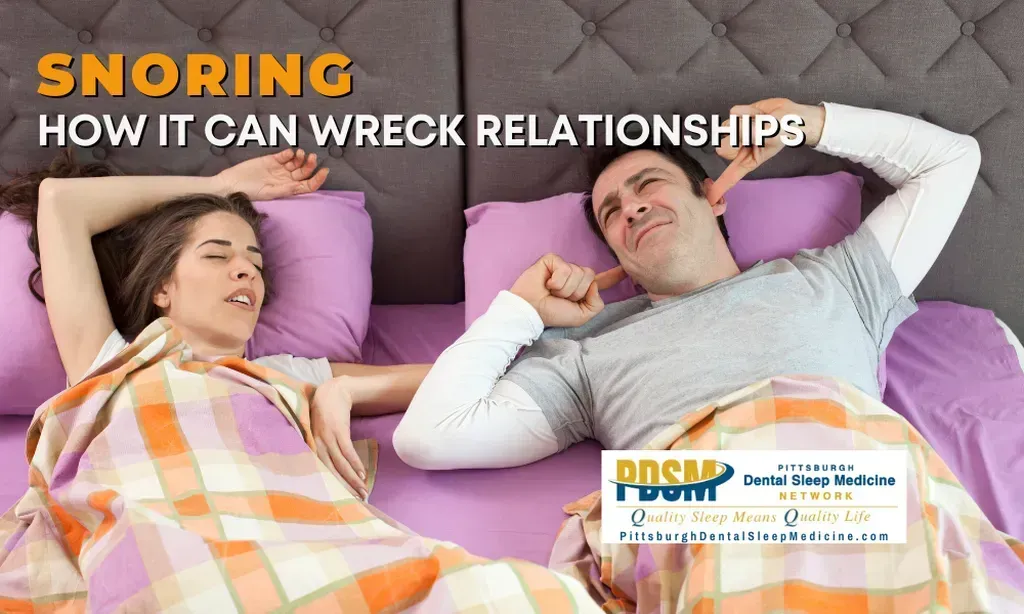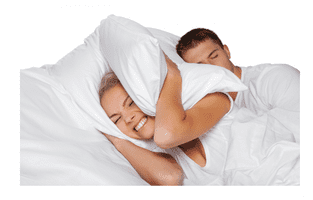Snoring: How it Can Wreck Relationships

Going to sleep together and waking up together is one of the most secure and intimate occurrences that couples can share, but mismatched sleep habits and disruptive sleep behavior can really throw a wrench in what should be a beautiful, symbiotic, bonding experience.
Howerver, according to the National Sleep Foundation, nearly one in for married couples end up sleeping in separate rooms, thanks to snoring and disruptive sleep patterns. In fact, several studies reveal that sleeping issues can be directly linked to marital problems.
DO YOU SLEEP IN SEPARATE ROOMS?
There can be many reasons why couples end up sleeping in separate rooms. Some common reason include:
- Different work schedules;
- One person is a night-owl and the other is early-to-bed early-to-rise;
- Arguments that lead you to different corners of the house;
- Room temperature or bedding
- Electronic devices
- Sleep disorders such as snoring, insomnia, obstructive sleep apnea, and restless leg syndrome
- Preference
Whatever the cause is for couples to part ways at bedtime, most of those reasons might possibly be rectified through compromise. Others, such as sleep disorders, aren’t as easy to fix.
WHAT ARE SLEEP DISORDERS?
Sleep Disorders can have devastating effects on relationships.
Researchers at the University of California, Berkeley found, in a study done with more than 60 couples, that not getting enough sleep can make you a less amiable toward your partner the next day. And since the quality of your relationship can also affect how you sleep, many sleep experts reveal that this can end up being a viscous cycle.
According to the American Sleep Association (AMA), sleep disorders currently affect as many as 50 to 70 million U.S adults. One of the biggest reasons why people end up sleeping alone is SNORING! A snoring problem can not only cause tiredness for the person who does it, but it also creates frustration, fatigue and resentment toward your bed partner.

WHAT CAUSES SNORING?
Snoring is loud breathing that occurs as you sleep. Everyone has a unique type of snore and there can be numerous reasons why people do it. Researchers assert that approximately 90 million Americans snore with 37 million of them doing it regularly.
Occasional, light snoring is usually nothing to be concerned about. However, if you snore loudly or find your sleep isn’t as restful as you would like, you may want to see your doctor to determine the cause of your snoring.
Many different things can cause snoring, some of which are in your control and others that are not. Some issues that can contribute to snoring include:
- Mouth and throat anatomy
- Deviated nasal septum
- Sleep deprivation
- Sleep position
- Alcohol consumption
- Obstructive sleep apnea
Snoring can be a symptom of a serious medical condition called sleep apnea. This disorder can rob you of the rest you need to maintain good health. Snoring can also disrupt your partner’s rest, which can negatively affect their health and wellness, not to mention the health of your relationship.
Researchers have found links between loud snoring and heart disease. There are also links to various types of daytime dysfunction, including cognitive problems, fatigue, headaches, and even weight gain.
WHAT CAN I DO TO REDUCE SNORING?
There are steps you can take to reduce your snoring and get a good night’s sleep. Some things to try on your own include:
- Altering your sleep position (avoid back sleeping)
- Losing weight
- Drinking more water during the day
- Changing to different pillows
- Clearing dust or pet dander from your bedroom
- Taking a hot shower before bed
- Avoid alcohol 3-4 hours prior to bedtime
- Keeping a clear nose
If these efforts don’t yield the desired results, schedule an appointment with your physician to determine if a more serious condition, such as Obstrictive Sleep Apnea (OSA), is causing your snoring.
WHAT IS OBSTRUCTIVE SLEEP APNEA
Sleep apnea is a common disorder characterized by frequent nighttime breathing disruptions. It often goes undiagnosed and can cause significant problems. Sleep apnea can disrupt your health, get in the way of your daily routines, negatively affect your performance at school or the workplace, and cause serious stress on or relationship.
There are several types of sleep apnea, but the most common is called obstructive sleep apnea. This occurs when the muscles in your throat relax so much during sleep that they obstruct your airway. Your body responds by gasping for air, a process that disrupts your sleep.
If you have any of the symptoms associated with sleep apnea it’s important to speak with your doctor and get screened. If left untreated can have very serious effects on heart health, cognitive health, stroke, diabetes, weight, and other body systems.
Get screened for Sleep Apnea if you suffer from any of these symptoms:
- Snoring
- Excessive daytime sleepiness
- Feeling un-refreshed in the morning
- Morning Headaches
- Stop breathing during sleep
- Choking or gasping during sleep
- Awakening with dry mouth or sore throat
- Impaired emotional or mental functioning
- Poor concentration and forgetfulness
- Difficulty staying asleep
- Type II Diabetes
- Hypertension
- Overweight
HOW IS SLEEP APNEA TREATED?
Your treatment path depends on your overall health and the severity of your sleep apnea. In cases where an underlying medical condition might be to blame, treating that condition is often the first step.
A common breathing therapy treatment that can help resolve issues related to sleep apnea and other breathing conditions is Continuous Positive Airway Pressure ( CPAP ). There are several types of CPAP devices, but all work to direct a flow of air into your airway, helping your body get the oxygen it needs to thrive.
When CPAP is not an option, or you prefer a different approach, doctors that specialize in sleep dentistry, such as
Pittsburgh Dental Sleep Medicine, offer oral appliances as an excellent alternative to CPAP. These devices are worn in your mouth while you sleep and help keep your airway open. They are noninvasive and nonintrusive, offering a custom fit, and are comfortable to wear.

HOW CAN AN ORAL APPLIANCE HELP WITH SNORING?
An oral appliance is a device that works in your mouth during sleep. It looks a lot like an orthodontic retainer or a sports mouth guard, although the technology behind oral appliances is more advanced. They work by improving your air intake while you sleep, and can reduce or even eliminate snoring.
Oral appliances are available from many dental offices, but most prefer to select one type of oral appliance and offer it to all patients. The team at Pittsburgh Dental Sleep Medicine recognizes that not everyone has the same set of needs (or the same anatomy) and that offering a range of options is a better way to help you find the right fit for your needs.
Most oral appliances fall into one of two categories: mandibular repositioning devices or tongue retaining devices. A tongue retaining device works by engaging the tongue and moving it to a more forward position in your mouth during sleep. Mandibular repositioning devices change the position of your jaw during sleep, which helps open your airway.
The experts at Pittsburgh Dental Sleep Medicine help you find the appliance best-suited for snoring that is also comfortable and nonintrusive.
Learn more during your snoring treatment consultation at Pittsburgh Dental Sleep Medicine. You can book an appointment in moments online or by phone AT (724)935-6670 today. All of our Sleep Dentists are board-certified through the American Academy of Dental Sleep Medicine.

